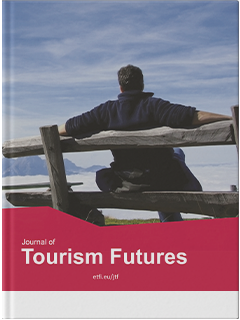Tourists' intention to visit green hotels: building on the theory of planned behaviour and the value-belief-norm theory
IF 6.6
Q1 HOSPITALITY, LEISURE, SPORT & TOURISM
引用次数: 14
Abstract
PurposeThis study integrates the theory of planned behaviour (TPB) and value-belief-norm (VBN) theory to investigate tourists' intention and behaviour to visit green hotels in Malaysia.Design/methodology/approachA total of 160 valid questionnaire responses were collected via an online survey. The partial least square–structural equation modelling (PLS-SEM) technique was utilised to assess the study framework and the hypothesised relationship.FindingsThe study's results confirmed that tourists' intention to stay at a green hotel is directly influenced by their subjective norms and perceived behavioural control. Besides, the study confirms the insignificant relationship between green trust, personal norms and tourists' stay intention. On the other hand, perceived morals, responsibility, willingness to pay more and perceived consumer effectiveness were significant in explaining the customer's subjective norms, personal norms and perceived behaviour control.Research limitations/implicationsThe hotel industry may benefit from this empirical outcome to devise effective marketing strategies for retaining their customers, particularly in rejuvenating the impact of the COVID-19 pandemic on the industry.Practical implicationsThis study provides valuable practical implications for green hotel operators to develop effective strategies to attract tourists to green hotel visits.Originality/valueThis study is the first to integrate the extended TPB and VBN theory to understand tourist intention to visit a green hotel. Notably, the extended TPB and VBN theory was practical and helpful in predicting tourist intention to visit a green hotel.游客绿色酒店旅游意向:基于计划行为理论和价值信念规范理论
目的本研究将计划行为理论(TPB)和价值信念规范理论(VBN)相结合,调查马来西亚游客参观绿色酒店的意愿和行为。设计/方法/方法通过在线调查共收集了160份有效问卷。偏最小二乘-结构方程建模(PLS-SEM)技术用于评估研究框架和假设关系。研究结果证实,游客入住绿色酒店的意愿直接受到他们的主观规范和感知行为控制的影响。此外,本研究还证实了绿色信任、个人规范与游客停留意愿之间的关系并不显著。另一方面,感知道德、责任、支付意愿和感知消费者有效性在解释顾客的主观规范、个人规范和感知行为控制方面具有重要意义。研究局限性/含义酒店业可能受益于这一实证结果,以制定有效的营销策略来留住客户,特别是在恢复新冠肺炎疫情对该行业的影响方面。实践意义本研究为绿色酒店运营商制定有效策略吸引游客参观绿色酒店提供了宝贵的实践意义。创意/价值本研究首次将扩展的TPB和VBN理论相结合,以了解游客参观绿色酒店的意图。值得注意的是,扩展的TPB和VBN理论在预测游客参观绿色酒店的意愿方面是实用的和有帮助的。
本文章由计算机程序翻译,如有差异,请以英文原文为准。
求助全文
约1分钟内获得全文
求助全文
来源期刊

Journal of Tourism Futures
HOSPITALITY, LEISURE, SPORT & TOURISM-
CiteScore
15.70
自引率
6.00%
发文量
64
审稿时长
34 weeks
期刊介绍:
 求助内容:
求助内容: 应助结果提醒方式:
应助结果提醒方式:


